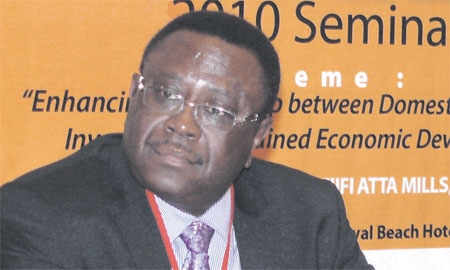Ghana’s political stability and sound macroeconomic policies provide the backdrop for a positive investment environment dating back to the country’s 1994 Investment Promotion Act. The country also represents an ideal launching pad for entering the Economic Community of West African States (ECOWAS), a market of more 250 million people. In President John Atta Mills’ drive to create a ‘Better Ghana’ before the end of his term in 2012, efforts to transform the private sector into the engine of the economy have resulted in further improvements to his country’s investment regime.
Working shoulder to shoulder with the private sector has been the order of the day for the Atta Mills administration, and not only in the sense of partnerships and closer collaboration (through bodies such as the newly created Private Enterprise Foundation, which encourages the creation of an enabling business environment through joint public-private efforts) but also as a means of channeling funding through to stimulate private sector growth.
The government has also redesigned its economic policies to accelerate this process of transformation, and while Ghana consistently ranks as one of the most business friendly destinations on the African continent, the drive to position the country as the gateway to West Africa has also meant continued efforts to reduce the general cost of doing business.
| ‘I want the GIPC to lead the whole of the West African investment promotion effort and for Ghana to become a conduit where investment arrives first’ |
The country’s Private Sector Development initiative is aimed at both contributing to the growth of the private sector and reducing the cost of doing business. A legislative reform division has been set up as part of this project to facilitate reform bills, including the Companies Code, the Insolvencies Bill, the Money Laundering Bill, and the Insurance Bill. Also, the project has resulted in the creation of a Medium-Term Private Sector Development Strategy Document that provides a comprehensive and coherent framework for the development of the sector.
The
Ghana Investment Promotion Center (
GIPC) is playing a key role in this scenario. Established in the same 1994 Act that outlined Ghana’s FDI regime, the GIPC is the first stop for new investors moving into the country. The agency oversaw a record 213 new projects totaling US$850 million in the first half of last year. According to CEO George Aboagye, the majority of the investment came from India, China, Nigeria, the U.K., Lebanon, Denmark, the Netherlands and South Africa, reflecting the GIPC’s recent promotion efforts throughout the Middle East and the Gulf as well as in London and South Africa. More than half of the projects are in the agricultural sector, followed by 40% in services and 8% in manufacturing. They are expected to create 100,000 new jobs.
Mr. Aboagye says that the agency’s efforts today are aimed at seeing the day arrive in which the attraction of investment is a normal occurrence.
“I want it to become normal for investors to think they should be in Ghana,” he says. “I want the GIPC to lead the whole of the West African investment promotion effort and for Ghana to become a conduit where investment arrives first, and then we distribute it to other countries.”
Ghana’s current investment incentives include tax rebates of up to 50% and tax holidays for certain sectors and in free zones (for the first 10 years). In addition, 100% foreign ownership is permitted and foreign investors retain the right to transfer all profits.

0 COMMENTS